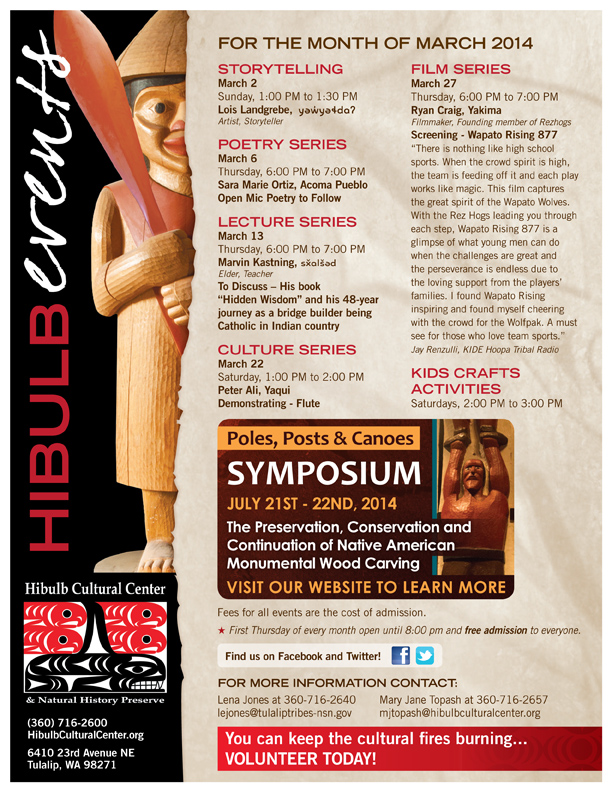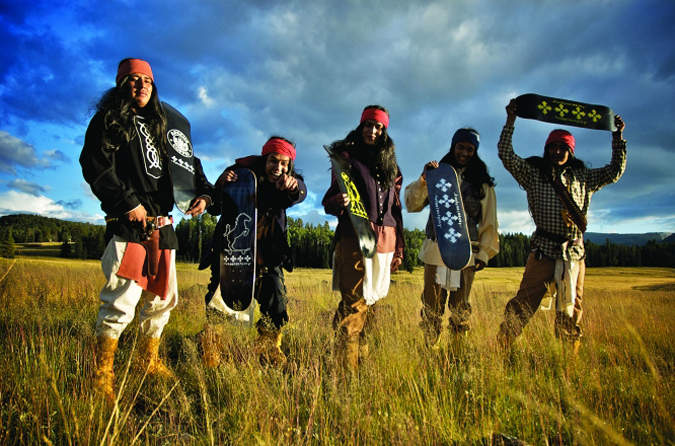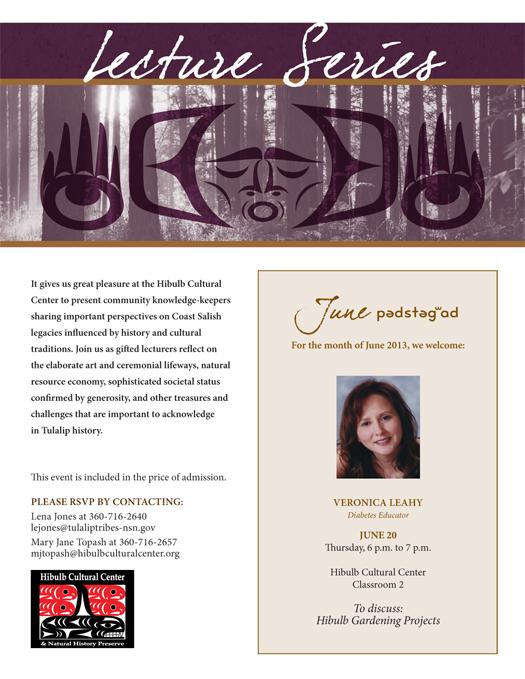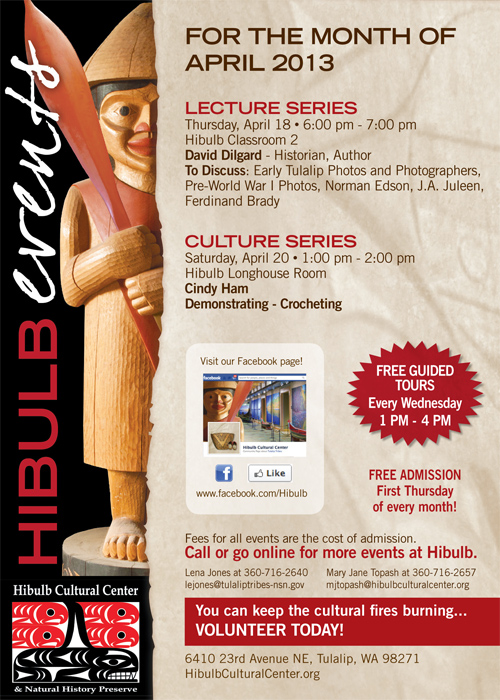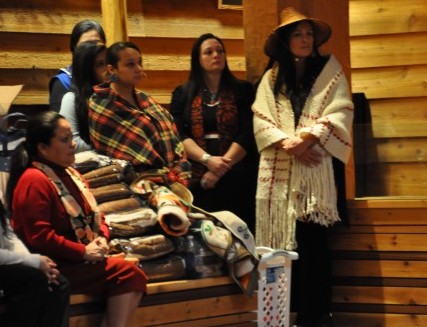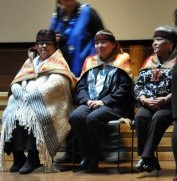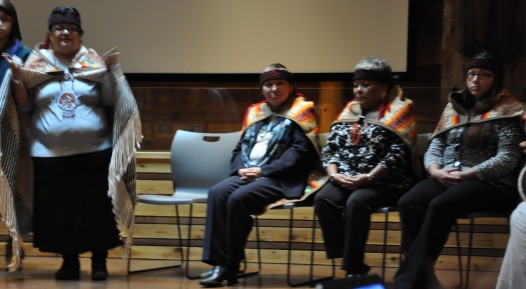Check out all the exciting events scheduled for the month of March at the Hibulb Cultural Center!
Tag: Tulalip Hibulb Cultural Center
Greenhouse Blessing at Tulalip Hibulb Cultural Center, Feb 12
Make a Holiday Wreath or Centerpiece, Hibulb, Dec 13
A day of remembrance: Veterans honored at Hibulb luncheon
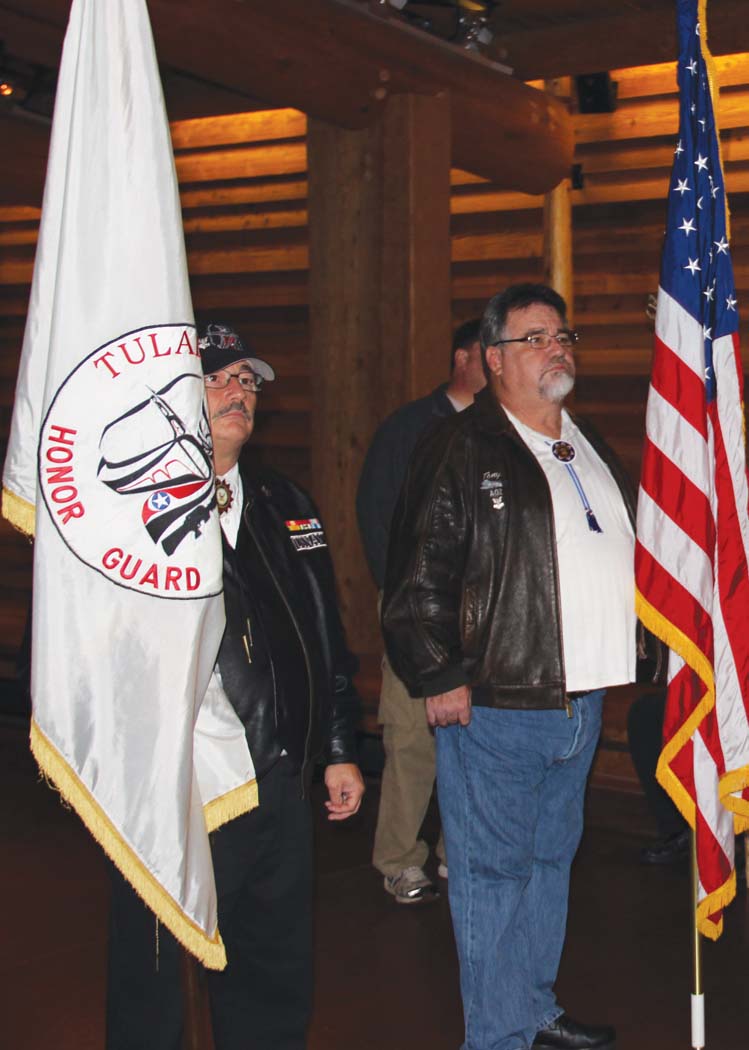
colors at the Veterans Luncheon.
Photo: Andrew Gobin, Tulalip News
By Andrew Gobin, Tulalip News Reporter
Veterans and their families packed the Longhouse at the Hibulb Cultural Center & Natural History Preserve on Monday, November 11th. The event hosted by Hibulb staff, which was open to all veterans in the Tulalip community, featured a lunch incorporating traditional foods in addition to an honoring and healing ceremony. Veterans that spoke reminded those in attendance about the sacrifices made by soldiers and their families, emphasizing the importance of remembering the cost of the world we live in.
With the presentation of the colors by the Tulalip Honor Guard, the Veterans Day celebration began. Each veteran was thanked with a blanket, introducing themselves while taking a moment to speak about their service. Some listed their rank and various wars and theaters, while others spoke about what Veterans Day means to them.

Photo: Andrew Gobin, Tulalip News
“It’s important to remember the veterans and to thank them,” said Tulalip Chairman Mel Sheldon, a Vietnam veteran. He referred to the ill tempers and bad attitudes that Americans had towards the Vietnam War, and in turn, how poorly returning soldiers were treated. “Today is a day to honor the sacrifice made. When war came you raised your hand, and we thank you for your service.”
“It is important to remember the families and their sacrifice,” said veteran, David Ventura. “They had to sacrifice time with their sons and brothers, and many times a life shared. Mothers, fathers, wives, brothers and sisters all had to live with the uncertainty of someone they loved dearly, for the service they gave to this nation.”
Korean War veteran Ray Moses spoke about the horrors of war.
“When I was in Korea,” he began, “my brother was killed right along side me. That moment was the most helpless feeling I have ever experienced. I couldn’t cry; I couldn’t get mad. All I could do was keep fighting. I had to. The worst memories I have are about death.”
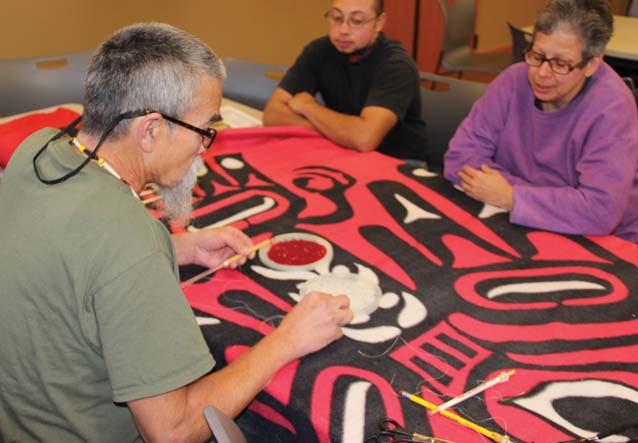
Photo: Andrew Gobin, Tulalip News
He paused a moment. “Why do I tell you these things? People these days say, ‘we don’t want to hear that, those old things.’ And I tell them, without those old things all these new things wouldn’t be here.”
Hibulb staff served a lunch of fry bread and hamburger stew, along with traditional foods including mushrooms, nettle tea, and black moss pudding, which in our culture is a medicine for calming the spirit and mind.
Poetry at Hibulb Cultural Center, tonight
Patricia Stein will be at the Tulalip Hibulb Cultural Center at 6 p.m. this evening for the Poetry Series event, with open mic following.
Skateboard Culture Exhibit Opens Today, Hibulb Cultural Center
Ramp It Up: Skateboard Culture in Native America
Tulalip Hibulb Cultural Center Temporary Exhibition
Opens August 10th, 2013 and runs through October 13th, 2013
“Ramp It Up” examines the role of indigenous peoples in skateboarding culture, its roots in ancient Hawaiian surfing and the visionary acheivements of contemporary Native skaters.
Skateboarding combines demanding physical exertion, design, graphic art, filmmaking and music to produce a unique and dynamic culture while illustrating how indigenous people and tribal communities have used skateboarding to express themselves and educate their youth.
Exhibit features
– Rare images and a video of Native skaters
– Contemporary artists
– Native skateboards
– Skate decks and more
“Skate culture is a great lens to learn about both traditional and contemporary Native American culture,” said Betsy Gordon, curator of “Ramp It Up.” “This exhibition not only showcases the Native skater, but also the Native elders, parents, government officials and community activists, who have encouraged their kids to skate.”
Smithsonian Connection
The exhibit was organized by the Smithsonian’s National Museum of the American Indian and circulated by the Smithsonian Institution Traveling Exhibition Service.
“Ramp It Up: Skateboard Culture in America” was previously on view at the Smithsonian’s National Museum of the American Indian in New York as well as at the National Museum of American Indian in Washington, D.C.
Tulalip Hibulb Lecture Series, Veronica Leahy
Veronica Leahy, Diabetes Coordinator for the Tulalip Tribes, will discuss ongoing Gardening Projects and the combined efforts of the successful ‘Gardening Together as Families’ work.
Tulalip Hibulb Cultural Center
Thursday, June 20 – 6-7pm, Hibulb Cultural Center Classroom 2
What’s happening at Hibulb in April
Lifting Our Sisters Up at Tulalip Hibulb Cultural Center
By Monica Brown, Tulalip News Writer
TULALIP, Wash.- “I never want to look at my granddaughter and say, sorry, there’s a one in three chance that you’ll be raped, sweetie,” exclaimed Theresa Pouley during the Lifting Our Sisters Up event held at the Hibulb Cultural Center on Feb 13th. Theresa Pouley is Chief Judge at Tulalip Tribal Court and a Colville tribal member; she was selected as one of the four witnesses asked to speak at the event.
It’s a shocking statistic when you realize it and if you turn to count the number of women in your own family; one in three of these women may have reported some type of sexual violence. Keep in mind though, 54 percent of sexual assaults are not reported to police. Until a remedial solution is found, Native woman will remain unprotected through current laws.
For Native women that are victims forging their way to become survivors, it is an uphill battle with the current laws in place today. The current ruling comes from a 1978 United States Supreme Court case, Oliphant v. Suquamish. The Supreme Court sided with Oliphant, stating that Indian Tribal courts do not have inherent criminal jurisdiction to try and convict non-Indians. The ruling ultimately left a loophole for offenders in which violence involving a non-Indian and an Indian on tribal land will result in the case being moved to federal court and since many cases don’t make it that far, and are unable to be prosecuted in tribal court offenders are able to walk free.
At the Lifting Our Sisters Up event Native woman gathered to share the painful truth of the peril that Native American woman are facing. Tulalip Vice Chairwoman, Deborah Parker opened the event by speaking encouraging words, “Today we are hoping to lift each other up, as sisters, as mothers, as aunties. Hopefully the words that are said here today will help you with your healing”.
The day of healing was filled with songs, prayers, and many tears. Women from Tulalip and surrounding tribes came forward to recount some of the most painful moments in their lives in order to break the silence and say, violence against Native women is more prevalent than you know, because it happened to them.
Tulalip Tribal member Carolyn Moses related memories of her youth growing up with domestic violence in her home life. She explained how her mother learned to be strong, and became a single mother who worked two jobs so that she could break the cycle of domestic violence and her children and her grandchildren would not have to endure it in their futures.
The Lifting our sisters Up event enabled women to speak out and tell the stories that are rarely shared in order to heal their spirit so that they may grow to be stronger women. The act of sharing personal hardships relieves some of the weight and to let go of the pain that can hold them down.
“Share your story, if someone can take what happened to you and use that. If someone is reaching out to you, help them, no matter if you get along with them or not,” urged witness and Tulalip tribal member Courtney Sheldon after recounting the injustices made against herself and her loved ones.
In order to overcome this hardship the laws in place need to change, whether it comes through VAWA or other means. Some may say they don’t understand the need for this type of rule adjustment and will even call it unconstitutional for non-Indians to be prosecuted in tribal courts. But, violations against Native women and some cases Native men need to be halted and the violators need to be held accountable for the life they ruin. What chance does a culture have to thrive when it is being torn down?
“We [Native Women] are an endangered species and what will happen to our tribal nations?” argued witness Cheryl Coan; who is from the Dine’ Nation and works at Tulalip’s Legacy of Healing.
To help spread the truth Canal Plus was invited to document these stories. Canal Plus, a French premium pay television channel that airs throughout Europe is similar to HBO in the U.S. Featured among many television selections, short documentary segments which focus on stories that are seldom told. Intrigued by the situation, Canal Plus traveled to Tulalip in order to document the stories of Native American women and the accounts of sexual assault and acts of violence which plague Indian Country.

